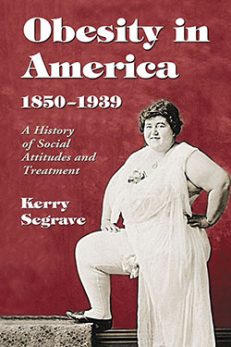Obesity in America, 1850–1939
A History of Social Attitudes and Treatment
$39.95
In stock
About the Book
This is a study of obesity in America from 1850 to 1939, concentrating on how the condition was viewed, studied, and treated. It examines the images and stereotypes that were associated with fatness, the various remedies that were proposed for the condition, and the often bizarre theories used to explain it, including the idea that ordinary tap water was fattening.
From about 1850 to 1879, obesity existed almost exclusively among the upper class, and it received very little medical attention. From 1880 to 1919, doctors, scientists, and other health professionals began to present a coherent theory of obesity. By 1920, the condition was recognized as a big enough health issue that various groups, ranging from private employers to public health officials, began developing some of the nation’s first organized weight reduction programs.
About the Author(s)
Bibliographic Details
Kerry Segrave
Format: softcover (6 x 9)
Pages: 208
Bibliographic Info: appendix, notes, bibliography, index
Copyright Date: 2008
pISBN: 978-0-7864-4120-4
eISBN: 978-0-7864-9207-7
Imprint: McFarland
Table of Contents
Preface 1
1. Obesity Emerges, Slightly, 1850–1879 3
2. Psychology and Effects, 1880–1919 18
3. Oddities, Sports, Clubs, Employment, 1880–1919 31
4. Causes and Cures, 1880–1919 48
5. Reducing, Diets, and Exercise, 1880–1919 71
6. Style and Prevalence, 1880–1919 110
7. Psychology and Effects, 1920–1939 116
8. Oddities, Sports, Clubs, Employment, 1920–1939 125
9. Causes and Effects, 1920–1939 132
10. Reducing, Diets, and Exercise, 1920–1939 139
11. Style, Prevalence, and Statistics, 1920–1939 159
Conclusion 168
Appendix: Average Weights of Men and Women (1931) 175
Notes 177
Bibliography 189
Index 197






